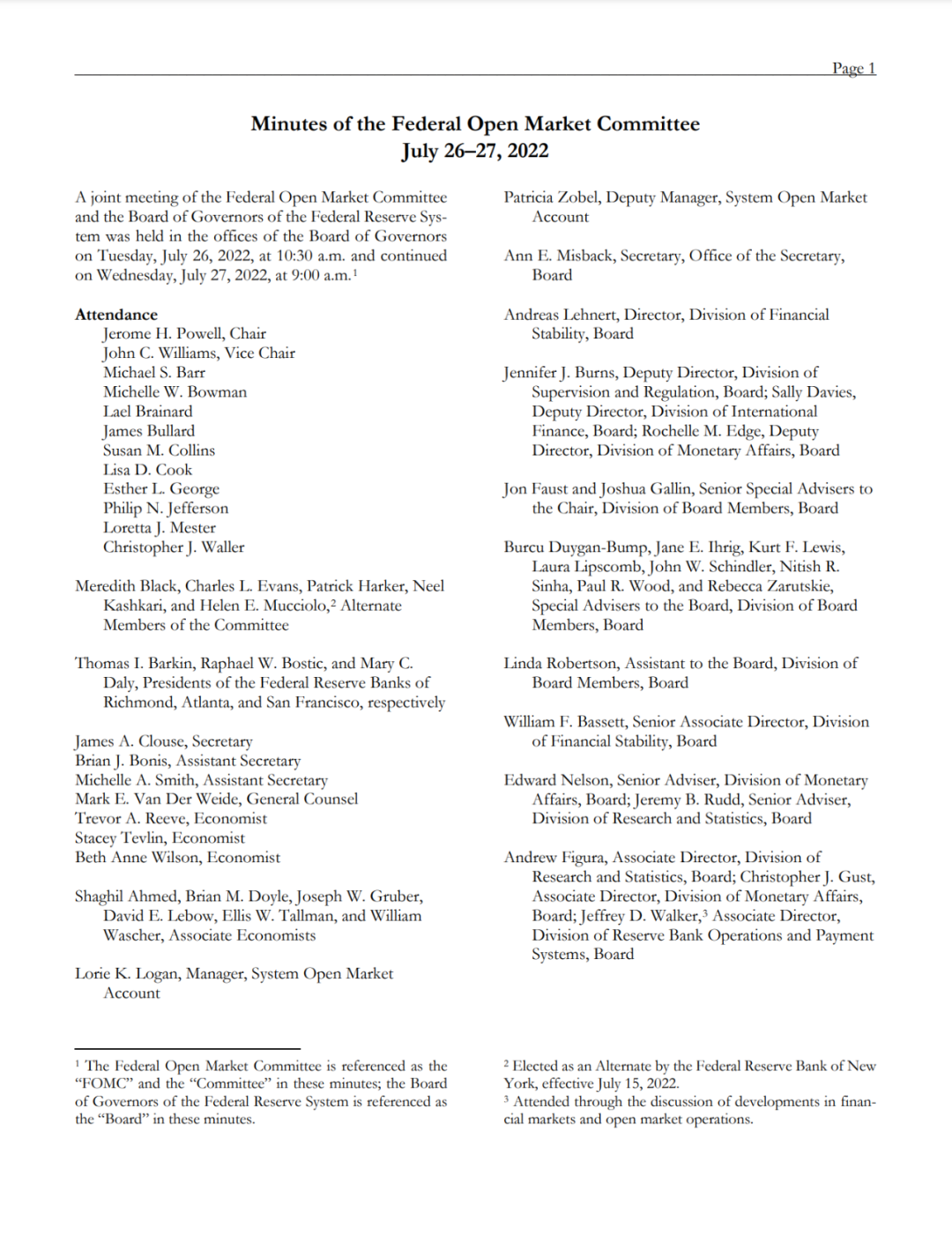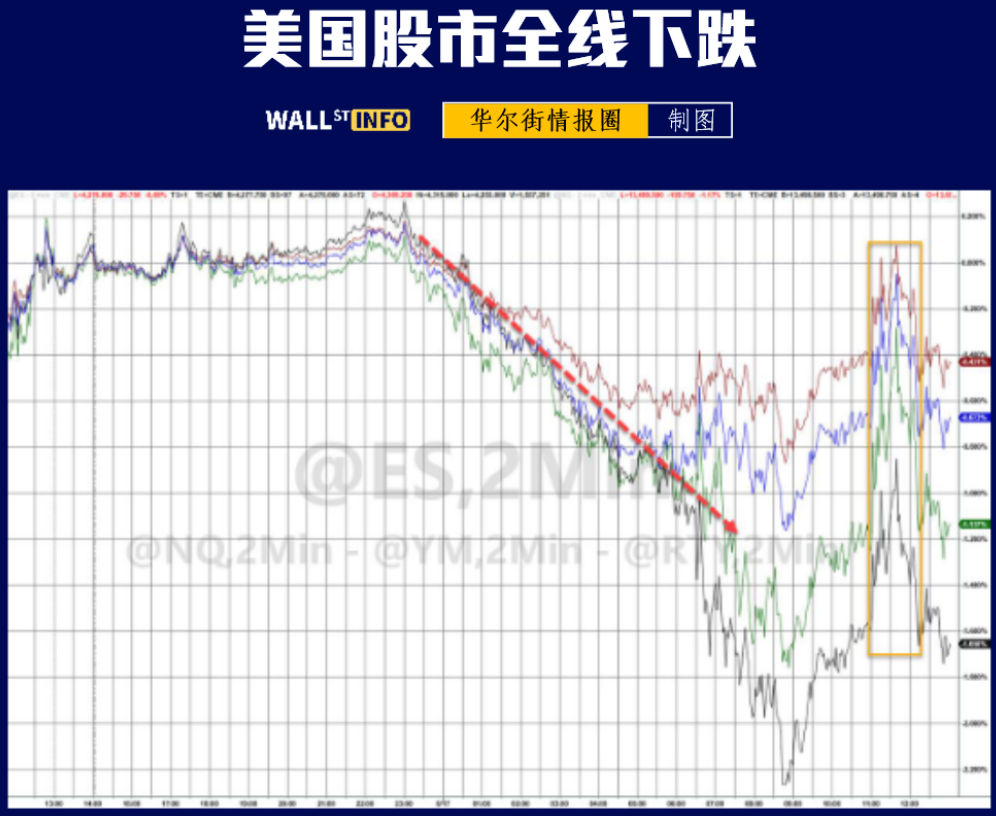A major event has settled. The minutes of the July meeting of the Federal Reserve were released at 2:00 am Beijing time on Thursday, with a total of 12 pages, suggesting that it will continue to raise interest rates, but acknowledging the risk of excessive interest rate hikes for the first time.
List of key points:
1. It is revealed that the rate hike may be lowered, but there is no clear conclusion on "raising interest rates by 50 basis points or 75 basis points" in September, and it depends on economic data in the future.
Before the announcement of the minutes of the meeting, the probability of raising interest rates by 75 basis points and 50 basis points reflected by the market is roughly equal. After the minutes were released, futures contracts showed that the chances of raising interest rates by 75 basis points next month dropped to about 40% (it should be noted that this probability will change at any time and is not decisive now).
2. "Excessive tightening" is a new word mentioned by the Federal Reserve, which has not been said before, and it is also the most important sentence in the 12-page meeting minutes. For the first time, the Federal Reserve acknowledged the risk of excessive interest rate hikes.
Minutes: Many participants expressed the view that, given the changing economic environment and the long and volatile lags in the impact of monetary policy on the economy, there was a risk that monetary policy positions would be tightened excessively beyond the level needed to maintain price stability.
3. Reiterate that inflation has deep-rooted risks.
Minutes: Participants agreed that there is little evidence that inflationary pressures are subsiding and that it will take a long time to solve the problem. A major risk for the Fed is that inflation could become entrenched if the public starts to question the committee's determination to adjust its policy stance adequately. If this risk materializes, it will complicate the task of returning inflation to 2 percent, potentially making interest rate hikes more economically costly.
4. Make a firm commitment to fight inflation, but at the same time imply the risk of economic recession.
Officials believe inflation is still unacceptably high, and will continue to actively raise interest rates until inflation slows down significantly, but this may pay a greater economic price.
5. The rate of interest rate increase still depends on economic data
Original words of the minutes of the meeting: Future interest rate decisions will depend on the following economic data, and it may take some time for policies to play a role and have a meaningful impact.
This summary reveals far more signals than we thought, but for professional investors, they need to see more information than ordinary people, so as to be invincible.
1) First, the minutes were less hawkish than expected, as they mentioned that "at some point it may become appropriate to slow down the pace of policy hikes". But don't expect Fed officials to change their rhetoric. Their remaining verbal hawkish is itself a more useful means than raising interest rates, which can lower inflation expectations.
At present, our reasoning of raising interest rates is still correct:
2) The US stock market fell, which is the biggest signal. We should know that the expectation of raising interest rates has dropped, but the stock market has fallen.
I mentioned a sentence in the article published yesterday afternoon:
If the U.S. stock market does not fall after the publication of this summary, it confirms the view that "the Federal Reserve has lost control of the market", and there will be a battle between the market and the Federal Reserve at some point.
Now it seems that the Fed still firmly holds the control of the market, and the impact of Fed officials' speeches on the market will become greater.
3) "Excessive tightening" is a new word, which will be heated up and lead to future changes. Yesterday's prompt came true.
The article published yesterday afternoon also warned:
Pay attention to what new information appears, such as "uncommon words" that have not been mentioned in the past may become the theme of future market hype.
While the Fed is still reinforcing the need to curb inflation, there are concerns about the possible problems of excessive policy tightening, and officials want to assess the effect of policy tightening on curbing inflation.
4) Inflation remains the Fed's top consideration, with 108 references in the minutes of the July meeting, up from 90 at the June meeting.
In the market's view, the inflation data released on August 10th shows that the CPI in the United States has started to decline since its high level, and inflation has probably reached its peak. After only one month's inflation data decline, the market has "stopped raising interest rates" or even "cut interest rates" in the first quarter of next year. However, the Fed is still wary of "misjudging inflation", which needs to fall, but mathematically speaking, it is difficult to fall enough to prompt the Fed to change its radical interest rate hike path. In the past, the Fed made a big mistake by saying that "inflation is temporary". Now, temporary inflation is just what the market is betting on.
$E-mini Nasdaq 100 - main 2209(NQmain)$ $E-mini S&P 500 - main 2209(ESmain)$ $E-mini Dow Jones - main 2209(YMmain)$ $Gold - main 2212(GCmain)$ $Light Crude Oil - main 2208(CLmain)$


Comments
[害羞]